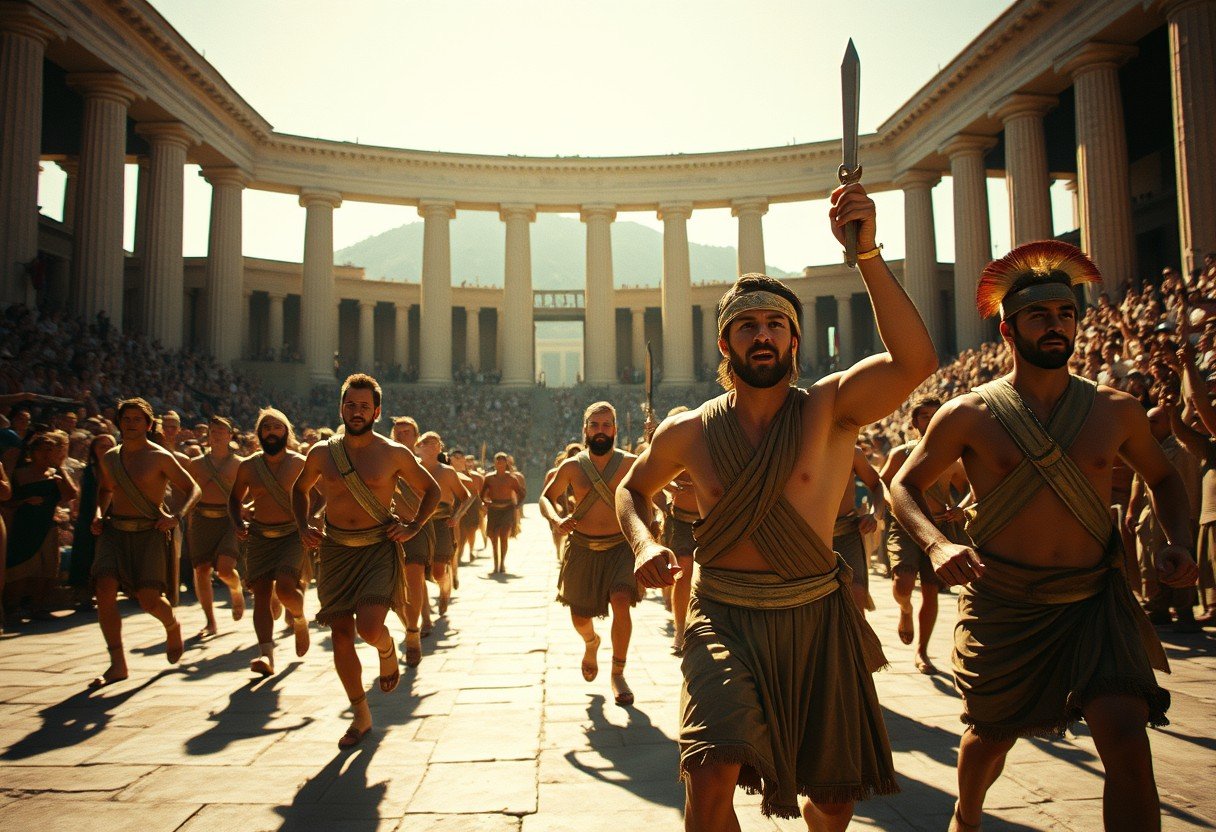Have you ever wondered about the origins of the sports we watch today? One popular Olympic sport has a name that comes directly from the ancient Greek word for “to exercise naked.” That sport is gymnastics. This practice wasn’t about being immodest; it was a deep-rooted cultural tradition in ancient Greece, celebrating the human body, physical fitness, and athletic excellence. This rich history reveals fascinating insights into their society and values.
The Surprising Origin of the Word ‘Gymnastics’
The term “gymnastics” is derived from the Greek word “gymnazein,” which literally means “to exercise naked.” This, in turn, comes from the root word “gymnos,” meaning “naked” or “unclothed.” In ancient Greece, this was standard practice for male athletes.
They trained and competed in facilities called “gymnasiums,” which were central to Greek life. These weren’t just places for physical training; they were also hubs for intellectual and social activities, underscoring the Greek belief in a balanced mind and body.
This connection between language and culture shows that the practice of exercising nude was fundamental to their concept of athletics. It was an open celebration of the human form, viewed as a tribute to the gods and a symbol of physical perfection.
Why Did Ancient Greeks Exercise Naked?
The practice of exercising in the nude held deep cultural and philosophical significance for the ancient Greeks. It wasn’t simply a matter of convenience; it was tied to their ideals of aesthetics, honor, and physical prowess.
Celebrating the human body was a key reason. The Greeks admired the male physique, and competing without clothing was a way to display the results of hard physical training. This ideal form was frequently depicted in their famous sculptures and pottery, immortalizing athletes as heroes.
Additionally, it was believed to be a tribute to the gods, especially Zeus, in whose honor the Olympic Games were held. Exercising naked was seen as a state of purity and a way to show complete dedication to the competition and the deities. This tradition emphasized that all competitors were equal, stripped of any social status that clothing might indicate.
From Ancient Training to the Olympic Games
The gymnasium was the training ground for athletes preparing for major competitions like the ancient Olympic Games, which began in 776 BC. These games were the most important athletic festival in the ancient world, bringing together competitors from various Greek city-states.
While gymnastics as a distinct competitive event didn’t exist in the same way it does today, the principles of gymnastics—strength, flexibility, and coordination—were the foundation for many Olympic sports. Athletes trained in these core skills to excel in events such as:
- Running
- Wrestling (known as “pale”)
- Boxing
- Pentathlon (a five-event competition including discus, javelin, jump, running, and wrestling)
Winning at the Olympics brought immense honor to an athlete and their home city. These revered individuals were seen as role models, embodying the Greek ideal of *arete*, or excellence and virtue. Their dedication to training in the gymnasium was the cornerstone of their success.
The Evolution of Gymnastics Through the Centuries
Gymnastics has transformed dramatically from its ancient origins. What began as a broad system of physical training for Greek citizens and soldiers has evolved into a highly specialized and artistic competitive sport. After the decline of ancient Greece, gymnastics was largely forgotten until it was revived in the 18th and 19th centuries in Europe.
Friedrich Ludwig Jahn, often called the “father of modern gymnastics,” developed many of the apparatuses still used today, such as the parallel bars and horizontal bar. His goal was to promote physical fitness and national pride in Germany.
This revival led to the inclusion of gymnastics in the first modern Olympic Games in 1896. Since then, the sport has grown to include a variety of disciplines, each showcasing incredible feats of athleticism and grace. Today, it is one of the most popular events at the Summer Olympics, captivating audiences worldwide with its blend of power and artistry.
Gymnastics’ Lasting Impact on Modern Sports and Fitness
The influence of ancient Greek athletic ideals, embodied by gymnastics, is still felt today. The emphasis on a well-rounded education that includes both physical and mental development is a direct legacy of the Greek gymnasium. This philosophy is the foundation of modern physical education programs in schools across the globe.
These programs aim to develop not just athletic skill but also discipline, teamwork, and a lifelong appreciation for health and fitness. The core principles of strength, balance, and flexibility taught in gymnastics are fundamental to nearly every other sport.
The spirit of competition, honor, and striving for excellence that was celebrated in ancient Olympia continues to inspire athletes today. The legacy of gymnastics is a reminder of the timeless importance of pushing the limits of human potential.
Gymnastics Compared to Other Ancient Greek Sports
While gymnastics provided the foundational training for many athletes, it’s interesting to see how its core concept compares to other specific sports of the era. All were practiced nude and valued physical excellence, but they had different focuses.
| Feature | Gymnastics (Training) | Wrestling (Pale) | Track (Stadion) |
| Primary Goal | Overall physical fitness, strength, and coordination. | To throw an opponent to the ground three times. | To be the fastest runner over a set distance. |
| Key Skills | Flexibility, balance, strength. | Leverage, grappling, strength. | Speed, endurance, power. |
| Cultural Role | Foundation of all physical education. | Celebrated for skill and strategy. | The original and most prestigious Olympic event. |
Understanding these distinctions helps clarify that “gymnastics” in ancient times was more of a holistic training system than a single competitive event. It was the essential preparation that enabled athletes to succeed in specialized competitions like wrestling and running.
Frequently Asked Questions
Which sport’s name means “to exercise naked”?
Gymnastics gets its name from the ancient Greek word “gymnazein,” which means “to exercise naked.” This is because ancient Greek athletes traditionally trained and competed without any clothing.
What was the purpose of exercising nude in ancient Greece?
Exercising nude was a cultural tradition that celebrated the beauty and strength of the human body. It was also seen as a tribute to the gods and a way to ensure all competitors were on an equal footing, without any distinctions of social class.
How is modern gymnastics different from the ancient version?
Ancient gymnastics was a broad system of physical training for all sports and military preparedness. Modern gymnastics is a highly specialized competitive sport with specific disciplines like artistic gymnastics, rhythmic gymnastics, and trampoline, featuring complex routines and scoring systems.
Was gymnastics the only sport practiced nude in ancient Greece?
No, nearly all sports in the ancient Olympic Games and other festivals were practiced nude. This included wrestling, boxing, running events, and the pentathlon. It was the standard custom for male athletes of that era.
Is gymnastics still a major Olympic sport today?
Yes, gymnastics is one of the most prominent and popular sports in the modern Summer Olympic Games. It includes multiple events for both men and women and draws massive global audiences due to its display of incredible athleticism, artistry, and skill.









Leave a Comment